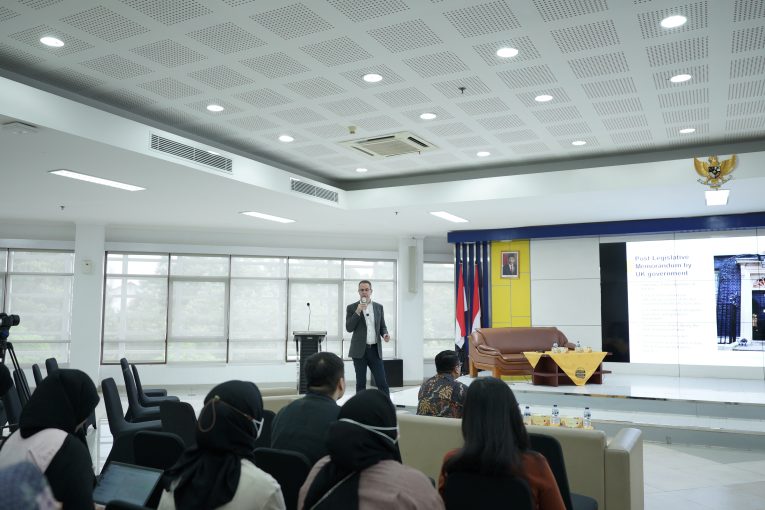
Yogyakarta, March 2nd 2023─POLGOV UGM cooperates with WFD to hold a national seminar entitled “Job Creation Legislation: Initiating Solutions to Legal Problems and Potential Impacts of Implementing the Law” in a hybrid way at the BA 4th Floor Auditorium of FISIPOL UGM and via Zoom Meeting (2/3). This discussion sheds light on the policy-making process as well as the impact of implementing laws, particularly the Job Creation Law in Indonesia.
This seminar is divided into two sessions. The first session was filled presenting Franklin De Vrieze (Head of Practice for Accountability WFD), Dr. Inosentius Samsul (Head of the DPR RI Expertise Agency), Dr. Mahaarum Kusuma Pertiwi (Lecturer at the Faculty of Law UGM), Prof. Purwo Santoso (Professor of Political Science UGM), and moderated by Agus Wijayanto (Indonesia Country Representative WFD). The second session presented Rafel Jimenez-Aybar (Environmental Democracy Adviser WFD), Al Khanif, Ph.D (Executive Director of the Center for Human Rights, Multiculturalism, and Migration, Faculty of Law, University of Jember), Dr. Wahyu Yun Santoso (Lecturer at the Faculty of Law UGM), Dr. Amalinda Savirani (Lecturer at the Department of Politics and Government UGM), and moderated by Dr. Arie Ruhyanto (Lecturer at the Department of Politics and Government UGM).
This discussion reintroduced Post-Legislative Scrutiny (PLS), which is a mechanism for overseeing the implementation of legislation. Meanwhile, RIA (Regulatory Impact Assessment) is a policy tool to determine how to achieve policy objectives. Through the results of this discussion, it is hoped that it can be a contribution related to solving policy-making problems in the future.
In the policy-making process in Indonesia, it was found that many laws had no clear references or even a weak framework. Parliamentary discussions that took place during policy-making were often roundabout and undirected. Therefore, the implementation of PLS supported by RIA will encourage a better policy-making process.
Post-Legislative Scrutiny in the legacy-making process in Indonesia has already built a system. This is as conveyed by Inosenti that, “Most of the current laws in the closing provisions have included how government monitoring must report or the legislative body will evaluate this law.”
According to Inosenti, the Omnibus Law method, which has received many demos from various circles, needs to be seen from a positive perspective, namely about changing the way we legislate, the way we think about making laws, and growing meaningful participation.
Mahaarum, regarding the Job Creation Law (UUCK) predicts a scenario after the Constitutional Court’s decision regarding formal changes to UP3 (Law concerning Formation of Legislation). This was done by changing the method of forming the law and incorporating the Omnibus Law into the amendment to Law 12/2011.
Meanwhile, according to Prof. Purwo Santoso, the rejection of legal formalities (including this Omnibus Law) is due to bad government practices or participation that is not good and not meaningful. According to him, if you want to standardize meaningful participants, you need academic texts that become a forum for communicating policies. Prof. Purwo also highlighted that the process in parliament is still considered stuttering because they are not used to formulating policies as the meeting point of three things, namely process, context, and substance.
In the second session, it was discussed further about the impact of implementing the Omnibus Law, namely the Job Creation Law. The process of legitimizing the Job Creation Law has raised pros and cons in various circles, including the trade unions who are considered to have been very affected by the passage of the Law. The Omnibus Law in environmental governance has also raised debate in relation to the investment permit policy which has been heralded as a solution.
“UUCK is related to the flexibility of the labor market which will later have an impact on all generations,” said Amalinda.
The government, in response to public demonstrations, actually discredited it with the question “Haven’t read it, how come you said it doesn’t fit”. Even though the sectoral ego is also getting bigger because people will only read the part of the policy that is related to them. Therefore meaningful participants need to be improved again with the implementation of PLS which pays more attention to knowledge management as a supply of information, not only for policy making but also for the general public.
